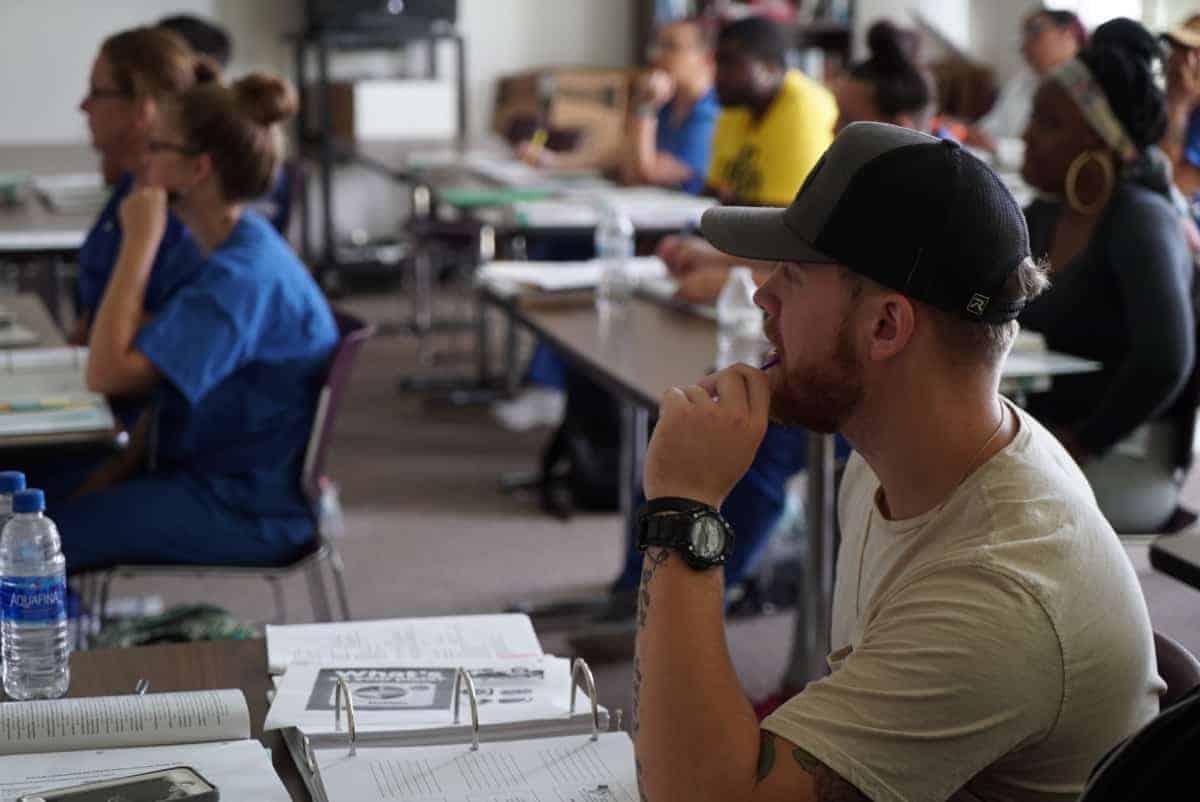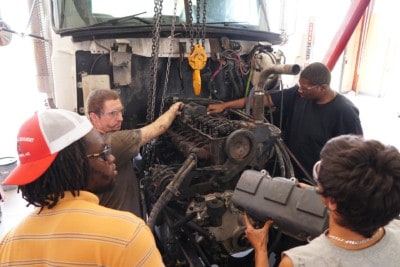Dale McInnis had just become president of Richmond Community College when the recession hit in the spring of 2009. Jobs all across the country were hard to come by, and North Carolina was no exception. The unemployment rate sat at 10.5 percent and soon reached its peak of 11.4 percent in January 2010.
As a result, more North Carolinians enrolled in community college as a way to get a degree or credential while riding out the economic recession. In 2009, enrollment in all program types (headcount) at North Carolina Community Colleges peaked at roughly 552,000.
But for Dale McInnis, the view from Richmond Community College looked very different. In 2011, unemployment in the two counties that RCC serves, Richmond and Scotland, was higher than the state rate by significant and devastating margins. Scotland County’s unemployment rate hit 17.5 percent, followed by Richmond County at 14.3 percent in 2011. But unlike other community colleges in North Carolina, the economic downturn alone did not push residents of Scotland and Richmond county to RCC. In 2010, RCC found itself ranked 42nd in enrollment of North Carolina’s 58 community colleges.
Today, RCC is ranked 24th in enrollment and has tripled their annual number of degree and certification completions. In a time when most community colleges in the state and across the nation are seeing a decline in enrollment, RCC is bucking the trend. A strong economy often means a downturn in enrollment, but the revitalization of Richmond Community College was never about responding to outside factors. Instead, they had to change from within.
Richmond Community College (RCC) is headquartered in Hamlet, North Carolina, a city of just under 6,500 citizens that sits seven miles from the South Carolina border. Hamlet used to be the largest city in Richmond County but was recently surpassed by neighboring Rockingham. Richmond County has a population of roughly 45,000 residents and has four public high schools; Scotland County is home to 35,000 residents and three high schools. By almost any indicator, both are considered two of North Carolina’s most rural counties. Both are the kind of place where people know one another and have for generations, and President McInnis is no exception.
Dale McInnis is one of only two presidents who were born and raised in the communities they now serve. As a native son of Richmond County, McInnis knows that success at Richmond Community College is vital to the quality of life in the place he has always called home.
“I have got people that I went to high school with that are sending their kids to me, counting on me.”
They are counting on McInnis and RCC to create opportunities for their kids and provide degrees and credentials that would lead to prosperous and sustainable jobs for Richmond and Scotland Counties. And in 2009, that was not the community college McInnis inherited.
McInnis’ first step in 2009 is the same element he credits with RCC’s success today: a business plan. “Our values are immutable. They don’t change,” said McInnis. “Our business model adapts based on the way the world changes. But we still have a business model.”
That first year, RCC set its sights on three key areas: improving partnership with local industry and public schools, career readiness and college transfer, and community development.
McInnis quickly realized that RCC was not offering courses worth the investment to residents then nor 10 years from then. As a result, in 2009, RCC was losing 700 potential students a year to Sandhills Community College, located just 35 miles up the road in Pinehurst.
“We did not offer courses that you would expect [at] a community college, and so we beefed up our curriculum. And we added faculty. We added sophomore level courses like calculus, statistics, and organic chemistry courses,” said McInnis.
To improve course offerings, RCC formed a partnership with NC State’s Department of Agriculture and Life Science. “[The partnership] had a two-fold purpose to ramp up our brand and also widening and expanding and deepening our curriculum so that we were offering a wide range of courses,” said McInnis. “We didn’t want a student to come here and have to transfer somewhere else to get the senior degree they needed.”
Richmond also began a partnership with Wingate University School of Pharmacy to develop a specific pathway for students to obtain an Associate in Science degree at RCC that also meets the prerequisite coursework requirements for application to the Wingate University School of Pharmacy.
McInnis and RCC leadership knew that these expanded course offerings should not be picked at random; they must lead to careers that provide students with high wages and job stability in North Carolina and around the country. “I will not do a two-year degree that does not lead to a high-paying job,” said McInnis. This intense focus on tying credentials and degrees to the local economy brought RCC to pursue several partnerships with industry leaders in the state.
One of RCC’s most prominent partnerships is with Duke Energy. RCC spent time understanding the background education and specific skill set Duke Energy wanted in an entry-level employee in their electric utility industry and industrial power facilities. Together they developed a corresponding curriculum to provide students with the skills to maintain high voltage equipment and protective systems for the electric utility transmission system. With this partnership, RCC set themselves apart from other institutions in the region and even in the state. Comparable degree programs at other institutions require five years of course work; the highly-specialized nature of the curriculum at RCC allows students to enter this competitive line of work after only two years.
These partnerships and expanded course offerings signaled to the community that RCC was not simply a one-year stop before Sandhills Community College. McInnis worked to show potential students that RCC was an institution invested in their schooling, their careers, and their lives. And he knew that approach could only succeed with a similar investment in his faculty.
Upon his arrival, McInnis eliminated the part-time permanent staff position. Permanent staff has grown from 180 in 2010 to 215 today. This choice was not driven by financial needs; it signaled that every staff member at RCC must be all in for students to succeed. Employee Appreciation Days are taken seriously, and faculty are strongly encouraged to pursue expanded professional development opportunities. Twelve new leadership positions have been developed, such as Director of K-12 Partnerships and Director of Student Retention and Intervention.
When asked what leadership means to him, President McInnis is clear. “It’s about ownership,” he said. Faculty members of every kind at RCC understand that helping students succeed requires a culture of accountability. Sheri Dunn- Ramsey, Associate Vice President of Marketing & Strategic Planning, can attest to this shift in culture. “I can’t emphasize enough how every [student’s] experience matters. And that is no matter what your position is here; whether you are the person who sweeps the floors or the person who writes the check. Every person has the same mindset that the student’s experience is [what] matters here, and making sure they’re successful is front and center,” Ramsey said.
Investment in faculty has also meant investment in the tools at their disposal. RCC has prioritized providing faculty with the technology necessary to improve completion rates and to link degrees and certificates to high-paying jobs. That includes deploying predictive analytics to target the factors that contribute most significantly to students falling behind and dropping out. Intervention and retention specialists design individualized outreach strategies for at-risk students. Advising software was improved to identify courses with large drop-out rates. For those high-risk courses, tutoring became mandatory.
RCC also invested early in a software program called CareerCoach (EMSI). The software includes an assessment tool for prospective students designed to identify their desired career, rather than focus on their course of study. The software then allows potential students to see if the career path exists within their community.
“This software allows us to look within a 50-mile radius of Hamlet, North Carolina so that we can see what employers are hiring for particular careers, what the job outlook is, and then we can actually link live to current job postings,” said Sherry. This methodology fit hand in glove with the RCC business model objective that all graduates should be able to transition directly into attainable jobs.
It was in light of this approach that RCC combined their Transfer Services and Career Centers. “We combined our career and transfer together because that was a real weakness. We were not doing a good job working with students on a career plan. Because if you want to be a pediatrician, you got to transfer. That’s your career plan. We did not do a good job of working with them on how to get into […] a specific major at a specific university and how to get accepted at that university,” McInnis said.
RCC recognized that if the ultimate goal is professional success for a student, they could not focus solely on traditional associate degrees. Instead, the Career and Transfer Center now takes an outcome-driven approach, understanding that the pathway to a lucrative job may mean readying a student for transfer to a four-year university.
The deployment of an aggressive business plan in an academic setting and a shift in accountability culture has met some resistance along the way. “We’ve got really low turnover now, but not at first. Not everyone can buy into this way of doing business,” McInnis explained. But nearly a decade later, RCC believes their results speak for themselves.
In 2018, RCC ranked 24th of 58 in enrollment, an impressive leap from 42nd place in 2010. In the 2010-2011 academic school year, total completions (degree, diploma, or certificate) hovered at just over 300. In 2017-2018, RCC completions totaled just under 900.



